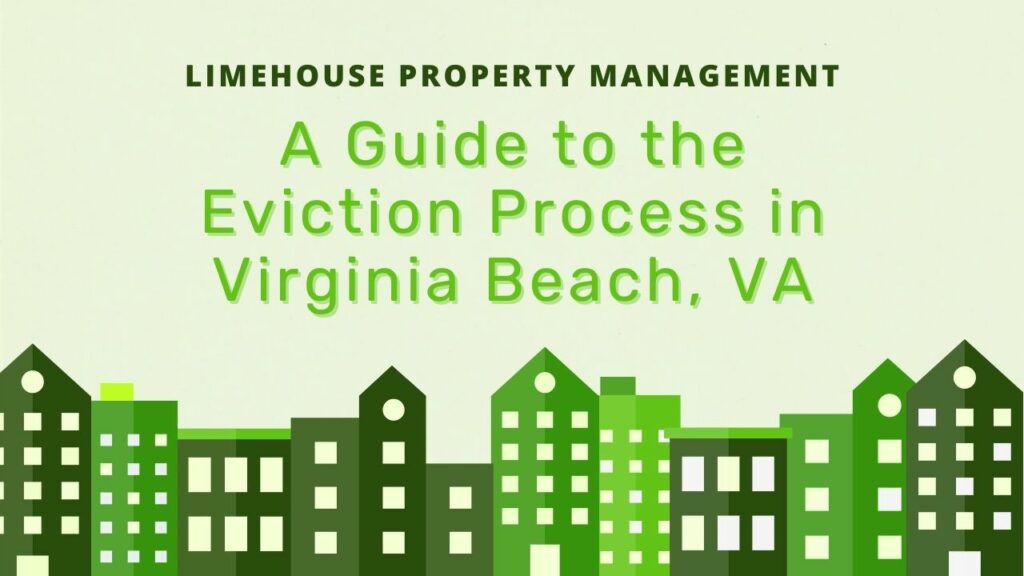A Guide to the Eviction Process in Virginia Beach VA

No landlord wants to evict a tenant. The process can be costly, stressful, and tedious. On the other hand, no landlord wants to rent to a tenant that is disrespectful, won’t pay rent, and won’t care for the rental property, among other things.
In the end, the landlord may be left with no other option than to evict the tenants. Virginia has a pretty straightforward eviction process, just as it has specific laws for security deposits. All of these are contained in the Virginia landlord tenant law. It’s important that the landlord familiarize themselves with it in order to carry out a successful eviction.
To help, Limehouse Property Management has provided an overview of a Virginia eviction!
Eviction Notice
To evict a tenant, the landlord must first terminate the lease agreement by serving the tenant with a written notification. The following are the various eviction types in the state of Virginia:
14 Day Notice to Pay
This must be served if the tenant fails to make their rent payments. For example, let’s say rent becomes due on the 1st of the month and becomes late on the 3rd. If the tenant doesn’t pay rent by the 3rd, the landlord can begin eviction proceedings against them by serving them with this written notice.
The one gives a tenant two options: to pay the overdue rent within 14 days or move out. If they don’t do either, the landlord can move to court and file an eviction lawsuit.
30-Day Notice to Comply or Quit
Another common reason for a tenant eviction in Virginia besides nonpayment of rent is lease violations. If the tenant violates the lease, the specific notice the landlord must serve depends on whether the lease violation that the tenant commits is curable or not.

For curable violations, the Virginia residential landlord must serve the tenant with a 30-Day Notice to Comply. This will give the tenant 21 days to correct their violation. Violations of this nature include keeping an unauthorized pet, excessive property damage, and having unauthorized occupants residing in the rental unit.
For violations that aren’t curable, the landlord must give the tenant a 30-Day Notice to Quit. Unlike other types of notices, this doesn’t give the tenant room to cure their violation. The tenant only gets one option: to move out. If they don’t and the notice period has expired, the landlord can move to court and file for potential forcible removal.
Holdover Eviction Notice
This can be the sort of tenant that overstays their lease. Most Virginia landlords serve this type of notice to renters whose leases they don’t want to renew.
The specific amount of notice to serve depends on the type of tenancy in operation. For renters on a week-to-week lease agreement, the landlord must serve them a 7-Day Notice to Quit. For those operating a month-to-month notice, the landlord must serve them a 30-Day Notice to Quit to proceed with the eviction process.
If the tenant doesn’t move out within the notice period, the landlord can move to court and file a summons and complaint.
Illegal Activities
For illegal activities, the landlord can start the eviction process immediately. Unlike other circumstances, the landlord won’t actually need to serve the tenant any prior notice.
Summons & Complaint
If the tenant doesn’t acknowledge the written notice and still doesn’t pay rent and the landlord still wants to evict them, the landlord can move to court and file an eviction lawsuit, also known as an unlawful detainer complaint. It must either be a district court or a circuit court, and there is a court filing fee.

The court summons and complaint must be served 10 days prior to the eviction hearing at court.
Court Hearing & Judgment
Once the summons and complaint have been filed with the appropriate court, the hearing must occur no later than 21 to 30 days after this.
Both parties may have a right to request a jury trial, in which case it’ll extend the process.
A no-show by the tenant for the hearing may result in a favorable judgment for the landlord. In such a case, the court will likely issue a judgment in favor of the landlord in the unlawful detainer action, and the eviction process will continue.
But, should the tenant answer the summons and complaints, then they will give an ear to both parties. In their defense, the tenant may cite any of the following as a reason for not honoring the notice:
- The landlord used “self-help” eviction methods. In Virginia and all over the country, it’s illegal to evict a tenant through any other means than that prescribed in Virginia laws. Examples of “self-help” eviction tactics include blocking the tenant’s access to rental property, throwing out the tenant’s possession and shutting off previously available utilities
- The landlord failed to follow the proper eviction procedure. Terminating a tenancy in Virginia requires strict adherence to the law. For instance, the landlord must start by serving the tenant with the appropriate notice. Missing this crucial detail will render the entire process void

- The eviction is retaliatory. The landlord cannot try to evict a tenant for exercising any of their given rights. If proven, the legal process will not only be dismissed but the landlord may also end up paying their tenant some monetary damages
- The evictions were as a result of discrimination. All forms of discrimination in housing are illegal under both state and federal law. According to the Virginia Fair Housing Law, it’s illegal to discriminate against a tenant based on sex, religion, race, national origin, disability, familial status, age, and color
Writ of Eviction
This is the tenant’s final notice to vacate their rented premises. After a successful ruling, the landlord must request the writ of eviction from the court. More often than not, the earliest it can be issued is 10 days after the judgment.
Once the landlord has obtained the writ of possession and delivered it to the sheriff, the tenant will have a maximum of 72 hours to move out. If the tenant does not vacate within this period, the sheriff will enforce the writ of possession, resulting in the tenant being forcibly evicted.
Bottom Line: How to Evict Tenants – Virginia Eviction Laws
Evictions are the last things any landlord wants. That’s why it’s best to have someone with the experience and resources to thoroughly screen tenants, deal with tenants, and handle the lease agreements. That someone can be Limehouse Property Management! We can also help the landlord understand the Virginia landlord-tenant law.
Contact us today to learn about our rental property management services. We’d be happy to speak to you!
Disclaimer: This blog about the Virginia eviction law should not be used as a substitute for legal advice from a licensed attorney. The Virginia law may change, and this post might not be updated at the time of your reading. If you need expert or legal help, kindly get in touch with a qualified attorney or an experienced property management company.
